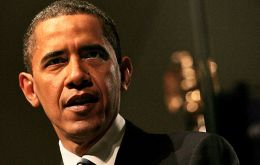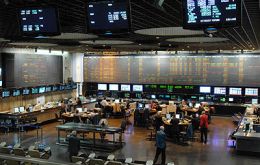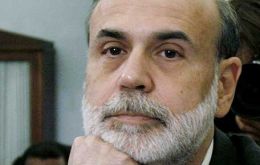MercoPress. South Atlantic News Agency
Economy
-
Saturday, October 30th 2010 - 18:57 UTC
Peru proposes South American Pacific countries free movement zone

Peruvian President Alan Garcia is proposing to Chilean President Sebastian Piñera a zone for free movement of goods, people and capital, a zone that would include Colombia, Panama, Ecuador, Peru and Chile.
-
Saturday, October 30th 2010 - 05:15 UTC
Iran “partner” in the industrialization of Bolivia’s lithium reserves

Bolivian President Evo Morales announced this week that Iran will “partner” in the development and manufacturing of the country’s lithium reserves, an association which had also shown interest from industry groups and governments of other countries.
-
Saturday, October 30th 2010 - 05:13 UTC
US economy growing again but not enough to quell frustration about jobs

The United States economy is growing but not enough to help with jobs. The US Commerce Department says GDP grew 2%, at an annual rate, between July and September - a slight increase from the previous quarter.
-
Friday, October 29th 2010 - 04:06 UTC
Argentine bonds post big gains and stocks hit new record

Argentine bonds posted big gains and stocks hit a new record high Thursday as markets anticipated a more business-friendly environment following the death of former president Nestor Kirchner.
-
Thursday, October 28th 2010 - 05:54 UTC
Argentine shares and bonds reacted positively to death of Kirchner

Argentine shares and bonds rose on Wednesday after the death of political heavyweight and former President Nestor Kirchner removed from the 2011 election campaign a contender seen as unfriendly to markets.
-
Thursday, October 28th 2010 - 05:29 UTC
Petrobras confirms light oil at deepwater exploration well in north-east

Brazilian government-controlled energy giant Petrobras said signs of oil found at in its first deepwater exploration well in the Sergipe-Alagoas Basin mark the opening of a new “exploratory frontier”.
-
Tuesday, October 26th 2010 - 05:11 UTC
Roubini forecasts “cloudy” outlook for the Argentine economy in 2011

Nouriel Roubini, the New York University professor who predicted the global financial crisis, said the outlook for Argentina’s economy is “cloudy” and GDP is slated to decline in 2011 as the global slowdown may lead to fewer exports.
-
Tuesday, October 26th 2010 - 04:46 UTC
Singapore wants to merge with Sydney and create Asia’s second financial hub

The Singapore stock exchange (SGX) has unveiled a multi-billion dollar bid for the company that owns the Australian Stock Exchange (ASX) in Sydney. If approved the 8.3 billion take-over would mark the first stock exchange merger in the Asia Pacific region.
-
Tuesday, October 26th 2010 - 04:32 UTC
US Treasury bonds fetch negative yield ahead of Fed’s actions to prop inflation

US Treasury Department sold securities that fetched a negative yield for the first time, implying investors are willing to pay the government to own its debt. This is a milestone in the current rock-bottom interest rate environment, as the Federal Reserve is widely expected next week to announce it will buy more Treasuries to jump-start a sluggish economy.
-
Tuesday, October 26th 2010 - 02:32 UTC
Iglesias praises agreement to giver emerging economies greater say in IMF

Enrique Iglesias, Ibero-America secretary general praised the G-20 decision to reform the IMF giving greater representation to the emerging economies but warned that the so called “currencies war” threatens to trigger a dangerous bout of protectionism at world level.
